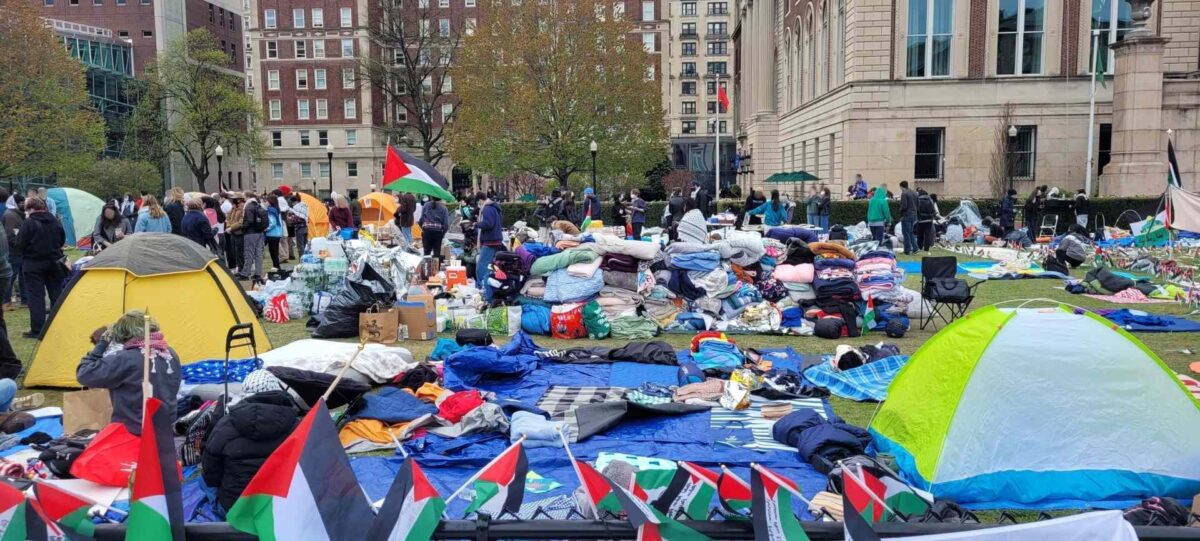Today marks the one-month anniversary of the student encampment movement, which started at Columbia University in New York City on April 17.
Since then, protests have spread to hundreds of campuses across North America and around the world, as students call for an immediate ceasefire in Gaza and to end their institutions’ complicity in Israel’s occupation of Palestinian land.
None of this should surprise us. Students have been at the forefront of every major progressive movement for change, from May 1968 in France, to the protests against the US war in Vietnam, to the struggle against Apartheid in South Africa, and much more.
In Canada, students have set up encampments at 15 universities, with more likely in the works.
The protests have been overwhelmingly peaceful–and diverse. On almost every campus, Palestinian, Arab, and Jewish students, among many others, have been organizing alongside one another to raise united demands.
During Passover, many encampments held the Seder, attracting participation from students of all backgrounds and faiths.
Like the students who came before them, they have faced repression and condemnation from administrators, politicians, the media, and the police.
And like their forebears, they’re on the right side of history.
That’s why the rest of us, including workers, should support the students.
Despite the shameful attempts to criminalize them, they’re doing exactly what we claim we want them to do: think critically, speak truth to power, and take collective action for the common good.
Students are raising legitimate questions about how their institutions invest their endowments and whether they’re complicit in genocide, ethnic cleansing, and other acts of war.
And why wouldn’t they? Our elected leaders pay lip service to human rights all the time. When students ask them to act on those words, they feel discomfort because it exposes their hypocrisy. And so the powers-that-be try to shut the students down.
But the repression is only building their movement, like it did for previous generations.
During the French May in 1968, widespread police violence drew workers to the campuses, in defence of the students. Before long, workers started raising their own demands. In just a matter of weeks, ten million people were on strike. The impact of that movement continues to be felt in France, decades later.
Today’s movement is still a long way from that scale of protest, but a similar dynamic is underway, as parents, professors, and campus workers show up to support the students–many of them facing arrest, too. Labour leaders are also speaking out, defending freedom of speech and assembly and other civil liberties.
Not surprisingly, the so-called “free speech warriors” who, in recent years, have been fuelling far right encroachments of campus, have said nothing to defend the students. In fact, many are demanding a clampdown.
More worrying is the response of administrators who are relying on the police to end the protests by force. Like we saw last week at the University of Calgary and the University of Alberta, and at numerous institutions across the US, some university presidents have allowed baton-wielding riot police to violently target their own students and faculty.
The labour movement must not stand by and let these outrageous acts take place. We need to show up, speak out, and back the students. The forces attacking their rights are the same ones attacking ours.
In recent months, trade unions across Canada have experienced rising police repression on picket lines–a direct attack on workers’ Charter rights to free and fair collective bargaining, including the right to strike.
Workers have also experienced reprisals by employers–discipline, suspension, and even termination–merely for expressing their identity as Palestinians or their support for Palestinian human rights.
Alarmingly, Ontario Premier Doug Ford continues to tolerate the Legislature’s racist ban on the keffiyeh, a deeply significant cultural symbol for Palestinians and Arabs.
Labour must oppose and condemn all these acts of repression. It’s not just the right thing to do, it’s in our own interest to ensure a robust defence of everyone’s collective rights.
Years from now, when the students have won their demands and society’s attitudes have shifted, the same institutions that are currently repressing the encampments will be celebrating their resistance–as if they supported it all along.
The University of Toronto, one of the last in Canada to divest from South African Apartheid, now offers scholarships in Nelson Mandela’s name to students whose community involvement demonstrates “a commitment to promoting peace, justice, citizenship and human rights.”
Sound familiar?
After just one month, students are making history again–and they’re just getting started. Workers have an interest in joining them. The better world that students are fighting for, from Gaza to Turtle Island, is one that would benefit working people everywhere.
The more that workers are a part of that struggle, the sooner it will win its demands.



